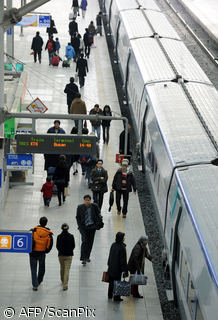Environment ministry unveils options to transform Czech power sector
Published:
31 October 2003 y., Friday
The Ministry of Environment last week unveiled a series of principles and policies that would radically transform the country's energy policy.
The philosophy underlying the 120-page policy document is that a fundamental change in current energy production must occur before the country can meet European Union (EU) demands to curb the greenhouse gases responsible for climate change.
The document is largely a response to the proposed future energy policy drawn up by the Ministry of Industry and Trade before the summer. Its favorite option, that of the country's biggest power company CEZ and, not surprisingly, the coal companies themselves, is for Czech power production to continue to be largely reliant on domestic power sources, notably coal-fired and nuclear plants.
The most serious flaw in that proposal, writes environmental ministry adviser Martin Bursik, the document's main author, is that it doesn't address how to counter the greenhouse gases produced and climate change caused by current Czech energy production and use. Czech membership in the EU and the EU's moves to take the global lead in countering climate change means the Czech Republic will come under increasing pressure to fall into line with this aspect of energy policy in the future, Bursik added.
Current emissions of greenhouse gases per person in the Czech Republic are around 30 percent higher than the EU average due to the heavy use of fossil fuels and inefficient production and use of energy.
Energy and transport together account for 42 percent of Czech emissions of carbon dioxide, the main greenhouse gas.
The Ministry of Industry and Trade also failed to take into account EU efforts to introduce ecological taxes, which would penalize the energy sources most responsible for greenhouse gases, namely brown and hard coal. A directive on ecological taxes is expected to be adopted by the European Commission within a few weeks. It will call for national taxes based on the carbon dioxide producing capacities of various fuels to be introduced by all countries including future members like the Czech Republic, Bursik said.
Such taxes would transform the current economics of the energy market and help to make renewable sources attractive. With the taxes and other incentives, renewable energy could account for 20 percent of Czech energy production by 2030, according to the environment ministry.
Šaltinis:
ceebiz.com
Copying, publishing, announcing any information from the News.lt portal without written permission of News.lt editorial office is prohibited.
The most popular articles
 The mission held constructive discussions with Prime Minister Emmanuel Nadingar, Finance Minister Gata Ngoulou, Infrastructure Minister Adoum Younousmi, and other senior officials.
more »
The mission held constructive discussions with Prime Minister Emmanuel Nadingar, Finance Minister Gata Ngoulou, Infrastructure Minister Adoum Younousmi, and other senior officials.
more »
 The EBRD is helping to improve the quality of power supply and stimulate renewable sources of energy in the Caucasus with an €80 million sovereign loan to Georgia for the construction of a new high voltage transmission line - the Black Sea High Voltage line, which will interconnect Georgia and Turkey.
more »
The EBRD is helping to improve the quality of power supply and stimulate renewable sources of energy in the Caucasus with an €80 million sovereign loan to Georgia for the construction of a new high voltage transmission line - the Black Sea High Voltage line, which will interconnect Georgia and Turkey.
more »
 The EBRD is helping to improve the infrastructure of the Georgian capital, Tbilisi, with a €100 million loan for the construction of a new railway route bypassing the city.
more »
The EBRD is helping to improve the infrastructure of the Georgian capital, Tbilisi, with a €100 million loan for the construction of a new railway route bypassing the city.
more »
 One of the men considered to be the founding fathers of the euro currency met MEPs on the Foreign Affairs Committee Tuesday (16 March) to talk about transatlantic relations.
more »
One of the men considered to be the founding fathers of the euro currency met MEPs on the Foreign Affairs Committee Tuesday (16 March) to talk about transatlantic relations.
more »
 European Trade Commissioner Karel De Gucht today opened a conference focused on the European Union's trade policy towards developing countries.
more »
European Trade Commissioner Karel De Gucht today opened a conference focused on the European Union's trade policy towards developing countries.
more »
 At the beginning of the 2000s, state ownership in financial intermediation in Mexico accounted for about 20 percent of the total credit of the banking system, provided through development financial institutions and funds.
more »
At the beginning of the 2000s, state ownership in financial intermediation in Mexico accounted for about 20 percent of the total credit of the banking system, provided through development financial institutions and funds.
more »
 Halving the number of business failures by offering individual support, doubling the number of young people who want to start their own business or raising by 500% the number of enterprising new cooperatives are just some of the projects nominated for the European Enterprise Awards 2010.
more »
Halving the number of business failures by offering individual support, doubling the number of young people who want to start their own business or raising by 500% the number of enterprising new cooperatives are just some of the projects nominated for the European Enterprise Awards 2010.
more »
 The European Commission has published the fourth call for proposals for the creation and upgrade of freight transport services under the second Marco Polo programme.
more »
The European Commission has published the fourth call for proposals for the creation and upgrade of freight transport services under the second Marco Polo programme.
more »
 The European Central Bank (ECB) today announced a programme of technical cooperation with the Central Bank of Bosnia and Herzegovina, in collaboration with a number of euro area national central banks (NCBs).
more »
The European Central Bank (ECB) today announced a programme of technical cooperation with the Central Bank of Bosnia and Herzegovina, in collaboration with a number of euro area national central banks (NCBs).
more »
 The EU disbursed today €1 billion to Romania, the second instalment of a €5 billion loan, which was agreed in May 2009 as part of a multilateral financial assistance package.
more »
The EU disbursed today €1 billion to Romania, the second instalment of a €5 billion loan, which was agreed in May 2009 as part of a multilateral financial assistance package.
more »